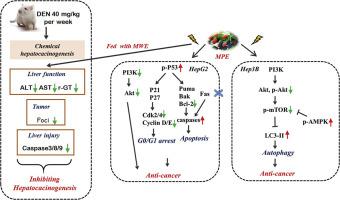当前位置:
X-MOL 学术
›
J. Food Drug Anal.
›
论文详情
Our official English website, www.x-mol.net, welcomes your feedback! (Note: you will need to create a separate account there.)
Mulberry fruits extracts induce apoptosis and autophagy of liver cancer cell and prevent hepatocarcinogenesis in vivo
Journal of Food and Drug Analysis ( IF 3.6 ) Pub Date : 2020-01-01 , DOI: 10.1016/j.jfda.2019.06.002 Kwok-Chui Cheng , Chau-Jong Wang , Yun-Ching Chang , Tung-Wei Hung , Chun-Jung Lai , Chi-Wen Kuo , Hui-Pei Huang
Journal of Food and Drug Analysis ( IF 3.6 ) Pub Date : 2020-01-01 , DOI: 10.1016/j.jfda.2019.06.002 Kwok-Chui Cheng , Chau-Jong Wang , Yun-Ching Chang , Tung-Wei Hung , Chun-Jung Lai , Chi-Wen Kuo , Hui-Pei Huang

|
Hepatocellular carcinoma (HCC) is one of the most common malignancies in Taiwan. Many risks factors induce liver chronic inflammation, fibrosis, cirrhosis, and hepatocellular carcinoma. Mulberry fruits containing polyphenols to remove free radicals and mitigate inflammation has been reported to not only against gastric cancer, melanoma and leukemia but also prevent liver injury induced by alcohol or CCl4 in previous researches. The aim of this study is to examine whether Mulberry could inhibit hepatocarcinogenesis. In animal experiment, diethylnitrosamine (DEN) was used to induce hepatic tumorgenesis. After injecting DEN, the rats treated with mulberry water extracts (MWE) had less and smaller tumor than others without MWE. Moreover, MWE reduced the serum ALT and AST, HCC marker, cleavage caspases, Ser-15-p53 and Ser46-p53 induced by DEN. Further, we observed that mulberry polyphenol extracts (MPE) inhibited the cell growth of HepG2 cell and Hep3B cell. By using flow cytometry and western blotting methods, MPE induced HepG2 cell apoptosis by increase subG1 cells and the elevated expression of caspase-3/8/9. Instead of apoptosis, MPE caused Hep3B cells autophagy by inhibiting Akt and mTOR phosphorylation. Comprehensively, mulberry extracts has a potential to be a health supplement to prevent hepatocarcinogenesis in the future.
更新日期:2020-01-01


























 京公网安备 11010802027423号
京公网安备 11010802027423号